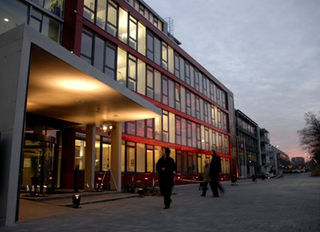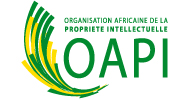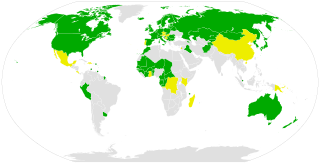
Intellectual property (IP) is a category of property that includes intangible creations of the human intellect. There are many types of intellectual property, and some countries recognize more than others. The best-known types are patents, copyrights, trademarks, and trade secrets. The modern concept of intellectual property developed in England in the 17th and 18th centuries. The term "intellectual property" began to be used in the 19th century, though it was not until the late 20th century that intellectual property became commonplace in most of the world's legal systems.

The World Intellectual Property Organization is one of the 15 specialized agencies of the United Nations (UN). Pursuant to the 1967 Convention Establishing the World Intellectual Property Organization, WIPO was created to promote and protect intellectual property (IP) across the world by cooperating with countries as well as international organizations. It began operations on 26 April 1970 when the convention entered into force. The current Director General is Singaporean Daren Tang, former head of the Intellectual Property Office of Singapore, who began his term on 1 October 2020.
A patent office is a governmental or intergovernmental organization which controls the issue of patents. In other words, "patent offices are government bodies that may grant a patent or reject the patent application based on whether the application fulfils the requirements for patentability."
Intellectual property rights (IPRs) have been acknowledged and protected in China since 1980. China has acceded to the major international conventions on protection of rights to intellectual property. Domestically, protection of intellectual property law has also been established by government legislation, administrative regulations, and decrees in the areas of trademark, copyright, and patent.
The International Federation of Intellectual Property Attorneys, is a non-political, international, professional body of intellectual property professionals, i.e., patent attorneys and trademark attorneys, in private practice. FICPI was established on September 1, 1906, and is based in Basel, Switzerland.
World Intellectual Property Day is observed annually on 26 April. The event was established by the World Intellectual Property Organization (WIPO) in 2000 to "raise awareness of how patents, copyright, trademarks and designs impact on daily life" and "to celebrate creativity, and the contribution made by creators and innovators to the development of economies and societies across the globe". 26 April was chosen as the date for World Intellectual Property Day because it coincides with the date on which the Convention Establishing the World Intellectual Property Organization entered into force in 1970. World Intellectual Property Day is WIPO’s largest intellectual property (IP) public outreach campaign.
The International Association for the Protection of Intellectual Property or AIPPI, an acronym for Association Internationale pour la Protection de la Propriété Intellectuelle in French, is a non-profit international organisation (NGO). Its members are intellectual property (IP) professionals, academics, owners of intellectual property and others interested in the subject. AIPPI was established in 1897.
The Centre for International Intellectual Property Studies, or Centre d'Études Internationales de la Propriété Intellectuelle (CEIPI) in French, is a Strasbourg, France-based training centre for specialists in intellectual property law. It was founded in 1963, as part of the University of Strasbourg by Professors Daniel Bastian (law) and Hubert Forestier (chemistry).
Kamil Eltayeb Idris is a Sudanese statesman, scholar and international civil servant. He was Director General of the World Intellectual Property Organization (WIPO) from November 1997 to September 2008. He was also head of the International Union for the Protection of New Varieties of Plants (UPOV). Idris stepped down a year early from his post as head of WIPO, amidst "allegations he misled WIPO about his age".
The United International Bureaux for the Protection of Intellectual Property (BIRPI) was an international organization. It was set up in 1893 to administer the Berne Convention for the Protection of Literary and Artistic Works and the Paris Convention for the Protection of Industrial Property. The BIRPI is the predecessor of the World Intellectual Property Organization (WIPO).

The Swiss Federal Institute of Intellectual Property (IPI), based in Bern, is an agency of the federal administration of Switzerland responsible for patents, trademarks, geographical indications, industrial designs and copyright.

The Organisation Africaine de la Propriété Intellectuelle or OAPI is an intellectual property organization, headquartered in Yaoundé, Cameroon. The organisation was created by Bangui Agreement of March 2, 1977. The Bangui Agreement was subsequently amended in 1999.

The African Regional Intellectual Property Organization (ARIPO), formerly African Regional Industrial Property Organization, is an intergovernmental organization for cooperation among African states in patent and other intellectual property matters. ARIPO was established by the Lusaka Agreement of 1976. It has the capacity to hear applications for patents and registered trademarks in its member states who are parties to the Harare (patents), Banjul (marks) and Arusha protocols. ARIPO also features a protocol on the protection of traditional knowledge, the Swakopmund Protocol, signed in 2010 by 9 member states of the organization which entered into force on May 11, 2015, and was amended on December 6, 2016.
Intellectual property organizations are organizations that are focused on copyrights, trademarks, patents, or other intellectual property law concepts. This includes international intergovernmental organizations that foster governmental cooperation in the area of copyrights, trademarks and patents, as well as non-governmental, non-profit organizations, lobbying organizations, think tanks, notable committees, and professional associations.

The Singapore Treaty on the Law of Trademarks is a treaty adopted by the World Intellectual Property Organization in Singapore on 28 March 2006. It entered into force on 16 March 2009, following the ratification or accession of ten countries, namely Singapore, Switzerland, Bulgaria, Romania, Denmark, Latvia, Kyrgyzstan, United States, Moldova, and Australia. The treaty establishes common standards for procedural aspects of trademark registration and licensing.

The Intellectual Property Office of Singapore (IPOS) is a statutory board under the Ministry of Law of the Government of Singapore. IPOS advises on and administers intellectual property (IP) laws, promotes IP awareness, and provides the infrastructure to facilitate the development of IP in Singapore.

WIPO Lex is an online global database launched in 2010, which provides free public access to intellectual property laws, treaties and judicial decisions from around the world. The World Intellectual Property Organization (WIPO) maintains and develops the database.

Daren Tang Heng Shim is the fifth and current Director General of the World Intellectual Property Organization (WIPO). He is also Secretary-General of the International Union for the Protection of New Varieties of Plants (UPOV). Tang previously headed the Intellectual Property Office of Singapore (IPOS) and was a trade lawyer for the government of Singapore.

Binying Wang is a Chinese lawyer who is the Deputy Director-General of the World Intellectual Property Organization (WIPO), Brands and Designs Sector.











